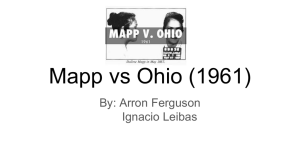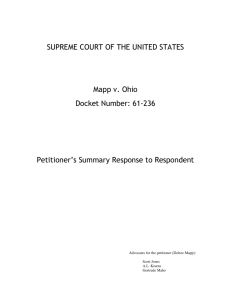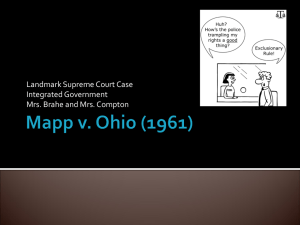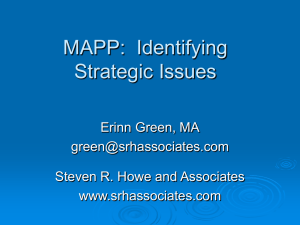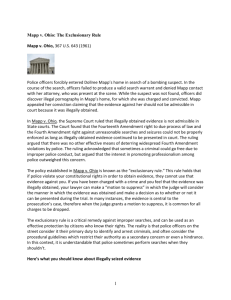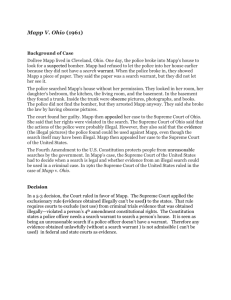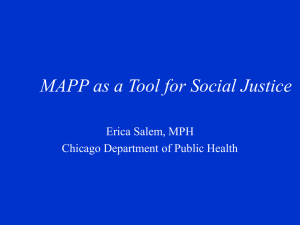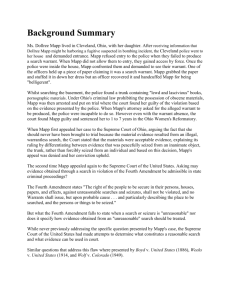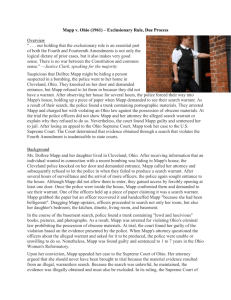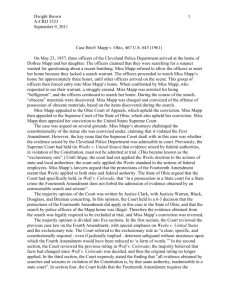Facts and Implications of Mapp v. Ohio
advertisement
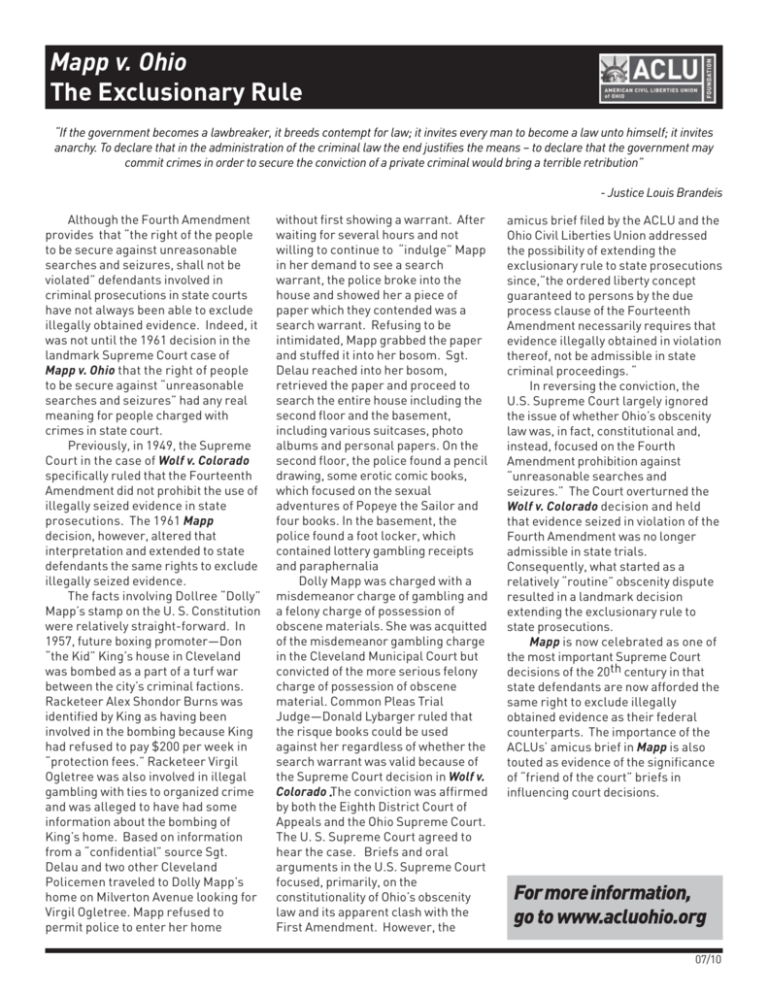
Mapp v. Ohio The Exclusionary Rule “If the government becomes a lawbreaker, it breeds contempt for law; it invites every man to become a law unto himself; it invites anarchy. To declare that in the administration of the criminal law the end justifies the means – to declare that the government may commit crimes in order to secure the conviction of a private criminal would bring a terrible retribution” - Justice Louis Brandeis Although the Fourth Amendment provides that “the right of the people to be secure against unreasonable searches and seizures, shall not be violated” defendants involved in criminal prosecutions in state courts have not always been able to exclude illegally obtained evidence. Indeed, it was not until the 1961 decision in the landmark Supreme Court case of Mapp v. Ohio that the right of people to be secure against “unreasonable searches and seizures” had any real meaning for people charged with crimes in state court. Previously, in 1949, the Supreme Court in the case of Wolf v. Colorado specifically ruled that the Fourteenth Amendment did not prohibit the use of illegally seized evidence in state prosecutions. The 1961 Mapp decision, however, altered that interpretation and extended to state defendants the same rights to exclude illegally seized evidence. The facts involving Dollree “Dolly” Mapp’s stamp on the U. S. Constitution were relatively straight-forward. In 1957, future boxing promoter—Don “the Kid” King’s house in Cleveland was bombed as a part of a turf war between the city’s criminal factions. Racketeer Alex Shondor Burns was identified by King as having been involved in the bombing because King had refused to pay $200 per week in “protection fees.” Racketeer Virgil Ogletree was also involved in illegal gambling with ties to organized crime and was alleged to have had some information about the bombing of King’s home. Based on information from a “confidential” source Sgt. Delau and two other Cleveland Policemen traveled to Dolly Mapp’s home on Milverton Avenue looking for Virgil Ogletree. Mapp refused to permit police to enter her home without first showing a warrant. After waiting for several hours and not willing to continue to “indulge” Mapp in her demand to see a search warrant, the police broke into the house and showed her a piece of paper which they contended was a search warrant. Refusing to be intimidated, Mapp grabbed the paper and stuffed it into her bosom. Sgt. Delau reached into her bosom, retrieved the paper and proceed to search the entire house including the second floor and the basement, including various suitcases, photo albums and personal papers. On the second floor, the police found a pencil drawing, some erotic comic books, which focused on the sexual adventures of Popeye the Sailor and four books. In the basement, the police found a foot locker, which contained lottery gambling receipts and paraphernalia Dolly Mapp was charged with a misdemeanor charge of gambling and a felony charge of possession of obscene materials. She was acquitted of the misdemeanor gambling charge in the Cleveland Municipal Court but convicted of the more serious felony charge of possession of obscene material. Common Pleas Trial Judge—Donald Lybarger ruled that the risque books could be used against her regardless of whether the search warrant was valid because of the Supreme Court decision in Wolf v. Colorado.The conviction was affirmed by both the Eighth District Court of Appeals and the Ohio Supreme Court. The U. S. Supreme Court agreed to hear the case. Briefs and oral arguments in the U.S. Supreme Court focused, primarily, on the constitutionality of Ohio’s obscenity law and its apparent clash with the First Amendment. However, the amicus brief filed by the ACLU and the Ohio Civil Liberties Union addressed the possibility of extending the exclusionary rule to state prosecutions since,”the ordered liberty concept guaranteed to persons by the due process clause of the Fourteenth Amendment necessarily requires that evidence illegally obtained in violation thereof, not be admissible in state criminal proceedings. “ In reversing the conviction, the U.S. Supreme Court largely ignored the issue of whether Ohio’s obscenity law was, in fact, constitutional and, instead, focused on the Fourth Amendment prohibition against “unreasonable searches and seizures.” The Court overturned the Wolf v. Colorado decision and held that evidence seized in violation of the Fourth Amendment was no longer admissible in state trials. Consequently, what started as a relatively “routine” obscenity dispute resulted in a landmark decision extending the exclusionary rule to state prosecutions. Mapp is now celebrated as one of the most important Supreme Court decisions of the 20th century in that state defendants are now afforded the same right to exclude illegally obtained evidence as their federal counterparts. The importance of the ACLUs’ amicus brief in Mapp is also touted as evidence of the significance of “friend of the court” briefs in influencing court decisions. For more information, go to www.acluohio.org 07/10
